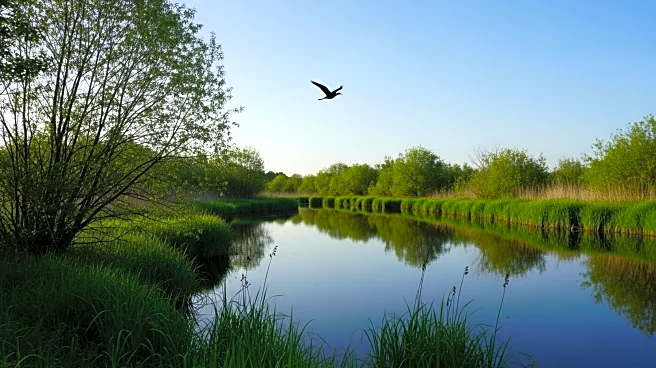What's Happening?
The U.S. Supreme Court's decision in the case Sackett v. Environmental Protection Agency has significantly narrowed the definition of the Waters of the United States, leading to a reduction in the number of wetland acres eligible for protection under the Clean Water Act. This ruling is estimated to have removed protections from more than half of the nation's wetlands. The decision has sparked discussions about its implications, particularly in states like Iowa, where water quality and wetland conservation are critical issues. Royal Gardner, a law professor and expert on biodiversity law, is addressing these concerns in a talk at the University of Iowa, highlighting the political and environmental ramifications of the Supreme Court's ruling.
Why It's Important?
The Supreme Court's decision has profound implications for environmental policy and conservation efforts across the United States. By narrowing the scope of protected waters, the ruling potentially exposes numerous wetlands to development and pollution, which could lead to increased environmental degradation. This change affects not only ecological habitats but also the communities and industries that rely on clean water resources. The decision may lead to shifts in regulatory approaches and could prompt legislative efforts to redefine water protections at the federal or state level. Stakeholders such as environmental groups, policymakers, and local communities are likely to engage in debates and actions to address the impacts of this ruling.
What's Next?
Following the Supreme Court's decision, there may be increased advocacy and lobbying efforts aimed at restoring or redefining water protections. Environmental organizations and state governments might pursue legal challenges or legislative measures to counteract the effects of the ruling. Additionally, there could be heightened scrutiny on development projects affecting wetlands, as stakeholders assess the environmental and economic consequences of reduced protections. The ongoing dialogue between legal experts, policymakers, and the public will be crucial in shaping future water conservation strategies.
Beyond the Headlines
The decision raises ethical and legal questions about the balance between economic development and environmental conservation. It highlights the ongoing struggle to protect natural resources in the face of political and economic pressures. The ruling may also influence public perception and awareness of environmental issues, potentially leading to increased civic engagement and advocacy for sustainable practices.









